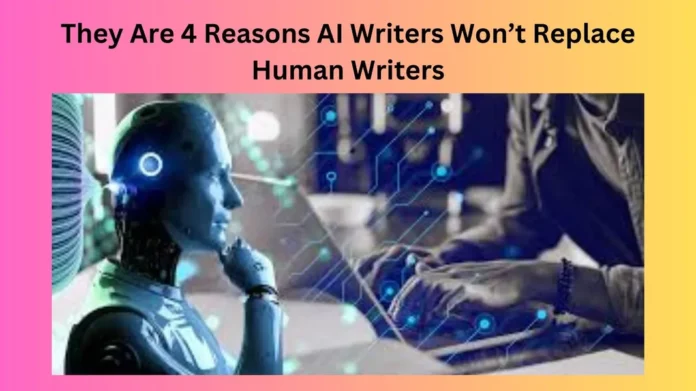Introduction
In a world that’s becoming increasingly digital, the role of artificial intelligence (AI) in content creation has grown significantly. However, the debate over whether AI writers can replace human writers is a hot topic in the content industry.
In this article, we’ll explore four key reasons why AI writers won’t fully replace human writers. We’ll delve into the intricacies of AI technology and its capabilities, shedding light on the unique qualities that make human writers indispensable.
1. The Essence of Creativity
AI may be a marvel of technology, but it lacks the essence of creativity that human writers bring to the table. Creativity is the ability to think outside the box, to weave words in a way that captivates and engages readers emotionally. While AI can generate content based on patterns and data, it cannot replicate the human spark that infuses creativity into storytelling.
2. Contextual Understanding
One of the fundamental challenges AI faces is its ability to grasp context. Human writers possess the unique ability to understand the intricacies of language, culture, and context, adapting their writing to suit specific audiences and situations. AI, on the other hand, often fails to discern the subtle nuances that make content relatable and relevant.
3. Empathy and Emotion
Writing often requires the infusion of emotion and empathy into the text to resonate with readers. Human writers can convey complex emotions, share personal anecdotes, and connect with readers on a deep level. AI, however, struggles to replicate the genuine emotional depth and empathy that human writers can infuse into their work.
4. Critical Thinking and Adaptability
Human writers possess the innate ability to think critically and adapt to evolving trends and topics. They can analyze, synthesize, and provide fresh perspectives on various subjects. AI writers, while proficient in data-driven content generation, lack the adaptability and critical thinking required to tackle unforeseen challenges and unique writing demands.
Conclusion
In conclusion, AI writers have undoubtedly revolutionized content creation, providing efficiency and accuracy in generating vast amounts of information. However, they can’t replace human writers due to the irreplaceable qualities of creativity, contextual understanding, empathy, and adaptability. The future of content creation likely involves a harmonious partnership between AI and human writers, where the strengths of both are leveraged to produce high-quality, engaging, and relevant content.
FAQs
FAQ 1: Can AI writers completely replace human writers in the future?
While AI writers have made significant advancements, they are unlikely to completely replace human writers. Human creativity, context understanding, empathy, and adaptability are qualities that AI struggles to replicate fully.
FAQ 2: How can human writers work alongside AI writers effectively?
Human writers can collaborate with AI writers by leveraging technology to streamline research and generate initial drafts. This allows them to focus on adding creativity, context, and emotion to the content, enhancing the final product.
FAQ 3: Are there specific types of content where AI writers excel?
AI writers excel in generating data-driven, repetitive, and technical content. They are well-suited for tasks like product descriptions, news updates, and data analysis reports.
FAQ 4: What is the role of human writers in an AI-dominated content landscape?
Human writers will continue to play a crucial role in content creation, particularly in areas that require creativity, storytelling, and a deep understanding of human emotions and culture.
FAQ 5: Can AI writers improve over time to match human creativity?
AI can improve, but it’s a long road to match human creativity. While AI can learn from existing content, it lacks the inherent human capacity for inspiration and original thinking that drives creativity in writing.















